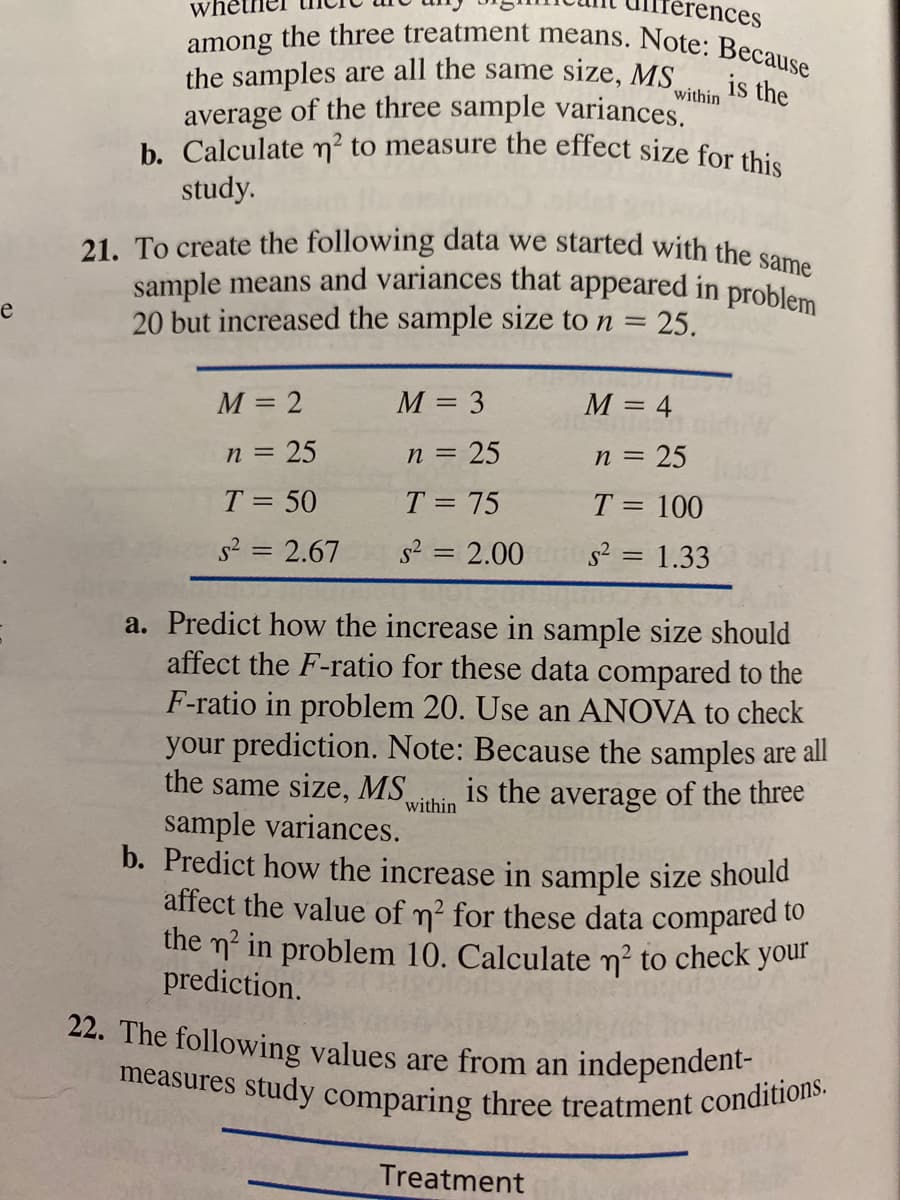21. To create the following data we started with the same sample means and variances that appeared in problem 20 but increased the sample size to n = 25. M = 2 M = 3 M = 4 n = 25 n = 25 n = 25 %3D T = 50 T = 75 T = 100 %3D s2 = 2.67 s2 = 2.00 s2 = 1.33 %3D %3D a. Predict how the increase in sample size should affect the F-ratio for these data compared to the F-ratio in problem 20. Use an ANOVA to check your prediction. Note: Because the samples are all the same size, MS sample variances. b. Predict how the increase in sample size should affect the value of n² for these data compared to the n? in problem 10. Calculate n? to check your prediction. within is the average of the three
21. To create the following data we started with the same sample means and variances that appeared in problem 20 but increased the sample size to n = 25. M = 2 M = 3 M = 4 n = 25 n = 25 n = 25 %3D T = 50 T = 75 T = 100 %3D s2 = 2.67 s2 = 2.00 s2 = 1.33 %3D %3D a. Predict how the increase in sample size should affect the F-ratio for these data compared to the F-ratio in problem 20. Use an ANOVA to check your prediction. Note: Because the samples are all the same size, MS sample variances. b. Predict how the increase in sample size should affect the value of n² for these data compared to the n? in problem 10. Calculate n? to check your prediction. within is the average of the three
MATLAB: An Introduction with Applications
6th Edition
ISBN:9781119256830
Author:Amos Gilat
Publisher:Amos Gilat
Chapter1: Starting With Matlab
Section: Chapter Questions
Problem 1P
Related questions
Question

Transcribed Image Text:ferences
measures study comparing three treatment conditions.
among the three treatment means. Note: Because
b. Calculate n? to measure the effect size for this
sample means and variances that appeared in problem
21. To create the following data we started with the same
whe
the samples are all the same size, MS
is the
within
average of the three sample variances.
study.
e
20 but increased the sample size to n
25.
M = 2
M = 3
M = 4
= 25
n =
= 25
n = 25
n =
T = 50
T = 75
T = 100
s2 = 2.67
s2 = 2.00
s2 = 1.33
a. Predict how the increase in sample size should
affect the F-ratio for these data compared to the
F-ratio in problem 20. Use an ANOVA to check
your prediction. Note: Because the samples are all
the same size, MS
sample variances.
b. Predict how the increase in sample size should
affect the value of n? for these data compared to
the n² in problem 10. Calculate n? to check your
prediction.
within
is the average of the three
22. The following values are from an independent-
Treatment
Expert Solution
This question has been solved!
Explore an expertly crafted, step-by-step solution for a thorough understanding of key concepts.
This is a popular solution!
Trending now
This is a popular solution!
Step by step
Solved in 4 steps

Knowledge Booster
Learn more about
Need a deep-dive on the concept behind this application? Look no further. Learn more about this topic, statistics and related others by exploring similar questions and additional content below.Recommended textbooks for you

MATLAB: An Introduction with Applications
Statistics
ISBN:
9781119256830
Author:
Amos Gilat
Publisher:
John Wiley & Sons Inc

Probability and Statistics for Engineering and th…
Statistics
ISBN:
9781305251809
Author:
Jay L. Devore
Publisher:
Cengage Learning

Statistics for The Behavioral Sciences (MindTap C…
Statistics
ISBN:
9781305504912
Author:
Frederick J Gravetter, Larry B. Wallnau
Publisher:
Cengage Learning

MATLAB: An Introduction with Applications
Statistics
ISBN:
9781119256830
Author:
Amos Gilat
Publisher:
John Wiley & Sons Inc

Probability and Statistics for Engineering and th…
Statistics
ISBN:
9781305251809
Author:
Jay L. Devore
Publisher:
Cengage Learning

Statistics for The Behavioral Sciences (MindTap C…
Statistics
ISBN:
9781305504912
Author:
Frederick J Gravetter, Larry B. Wallnau
Publisher:
Cengage Learning

Elementary Statistics: Picturing the World (7th E…
Statistics
ISBN:
9780134683416
Author:
Ron Larson, Betsy Farber
Publisher:
PEARSON

The Basic Practice of Statistics
Statistics
ISBN:
9781319042578
Author:
David S. Moore, William I. Notz, Michael A. Fligner
Publisher:
W. H. Freeman

Introduction to the Practice of Statistics
Statistics
ISBN:
9781319013387
Author:
David S. Moore, George P. McCabe, Bruce A. Craig
Publisher:
W. H. Freeman